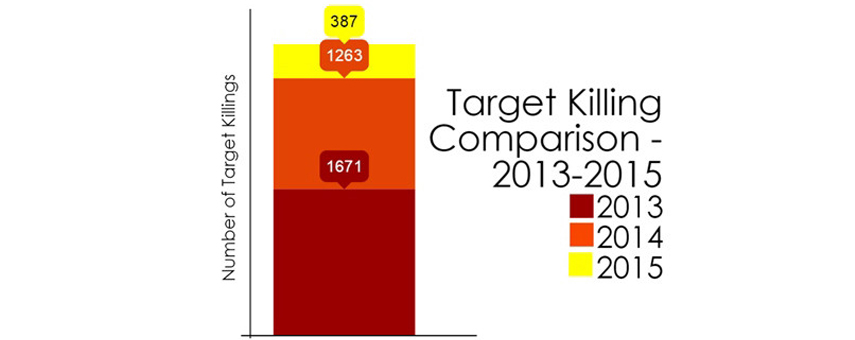by Zeeshan Salahuddin
How did Pakistan do in 2015?
Pakistan seems to be perched at the verge of a dramatic turnabout that will forever alter its conditions internally, its perception externally, and its future historically. Data from 2015, gathered by the Center for Research and Security Studies, suggests a sharp decline in violence across Pakistan. Fatalities have decreased significantly, and the overwhelming majority – over 62% – of those killed in the violence were militants, insurgents and criminals.
This remarkable change is visible even in Karachi. In 2013, target killing was rampant, claiming 1,671 lives. A year later, the deaths dropped by about 25% to 1,263. In 2015, the number dropped by an astonishing 71%, to only 387 fatalities.
Economically, the China-Pakistan Economic Corridor (CPEC) was hailed as a lifesaver. With a massive investment of $46 billion, Beijing seemed to emerge as a savior, willing to drag Pakistan into a new era of economic prosperity and global fraternity. The failure of domestic economic policies and problems with the tax net notwithstanding, CPEC was lauded as a concept, but criticized for its apparent lack of transparency.
On the regional relations side, there was an ostensible thaw in ties with India in December. It all began with Ashraf Ghani’s remarks at the Heart of Asia conference in Islamabad, and a subsequent presser in Kabul, reiterating his desire to engage with Pakistan. Later that month, following Indian External Affairs Minister Sushma Swaraj’s visit to the same conference, the Indian premier made an unprecedented, unscheduled visit to Lahore, furthering the idea that the two countries wanted to return to some semblance of normalcy.

But a lot of the progress made in 2015 seems to have been undone as the second month of 2016 draws to a close.
First, despite continued success in the FATA military offensive, reconciliation with the Baloch nationalists, and the urban pacification in Karachi, Interior Minister Chaudhry Nisar Ali Khan says the fight against radicalism and extremism will be long and painful. But his commitment to that fight was questioned after civil society activists raised concerns about the government’s reluctance to arrest firebrand cleric Maulana Abdul Aziz residing less than a mile from the Parliament.
Simultaneously, the controversy over the route of the CPEC began to worsen as 2015 gave way to 2016. Political parties cried foul, accused the federal government of favoring Punjab, and threatened to stage protests. Despite the efforts of Federal Minister for Planning Ahsan Iqbal, this continues to be a problem. The concerns are deeply entrenched and historically weighted.
Finally, with Pakistan blaming Afghanistan-based militants for the attack on Bacha Khan University, and India implying that the Pathankot Airbase attack was orchestrated by Pakistani handlers, there are new complications in regional politics.
In all these situations, one critical component that seems to be missing is sincerity – sincerity of action in going after militants and extremists of all kinds, sincerity in ensuring transparency on the route of CPEC, sincerity in a carefully developed and well defined foreign policy, and sincerity in wanting to see Pakistan emerge from the turmoil of the last 15 years as a successful nation.
The author is a journalist and a Senior Research Fellow at the Center for Research and Security Studies, Islamabad This article originally appeared in Friday Times: http://www.thefridaytimes.com/tft/brink-of-change/

